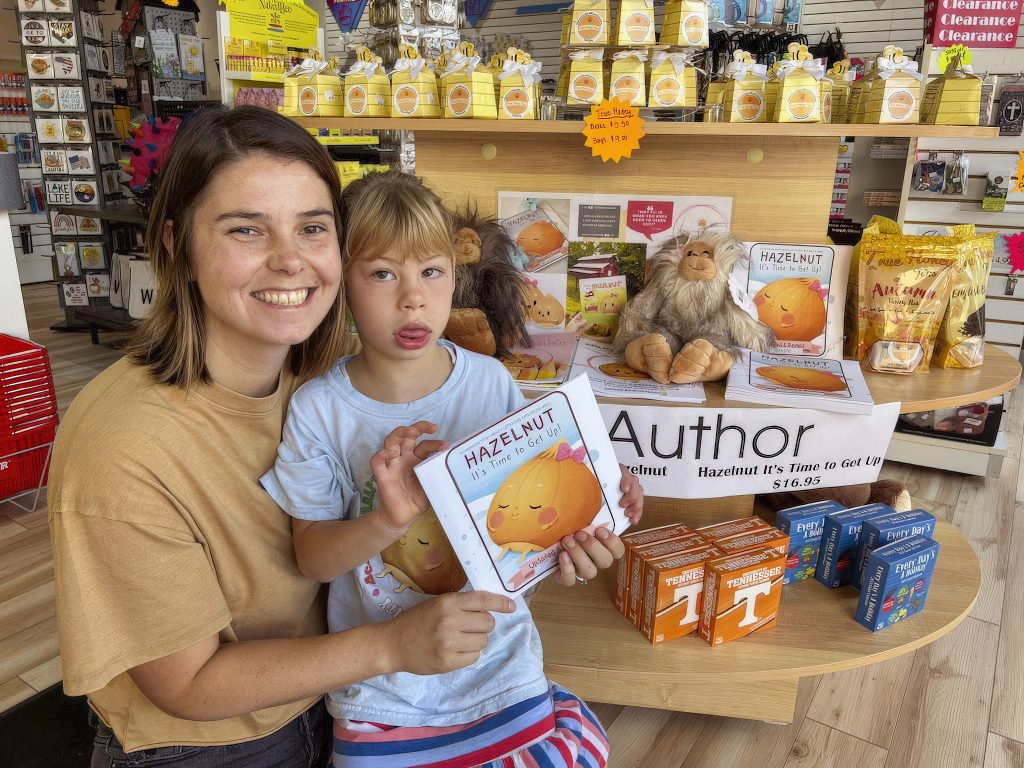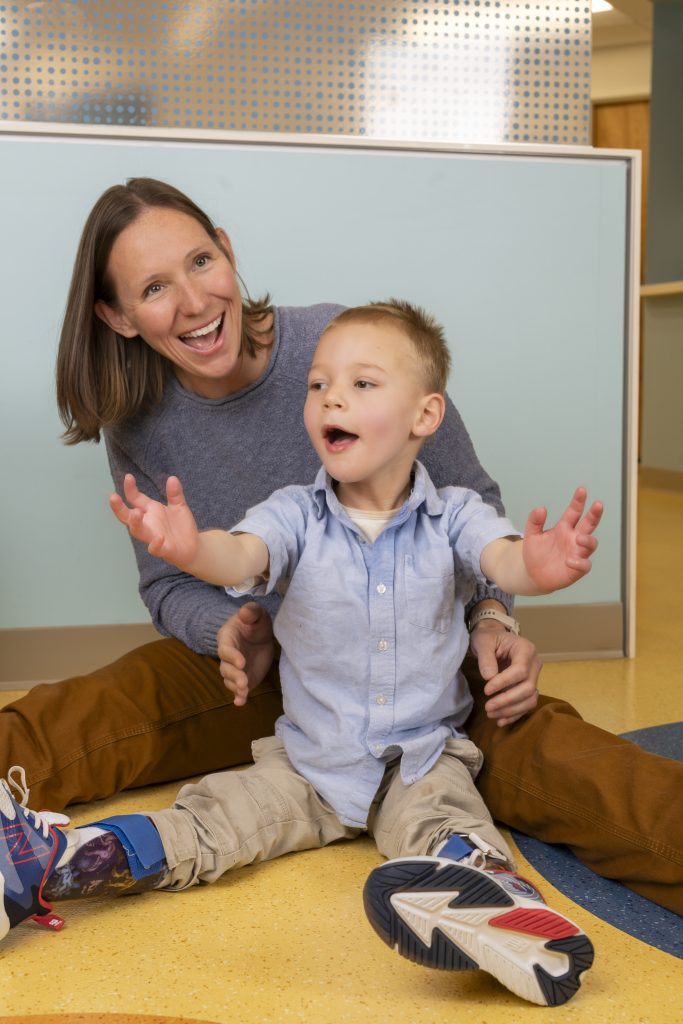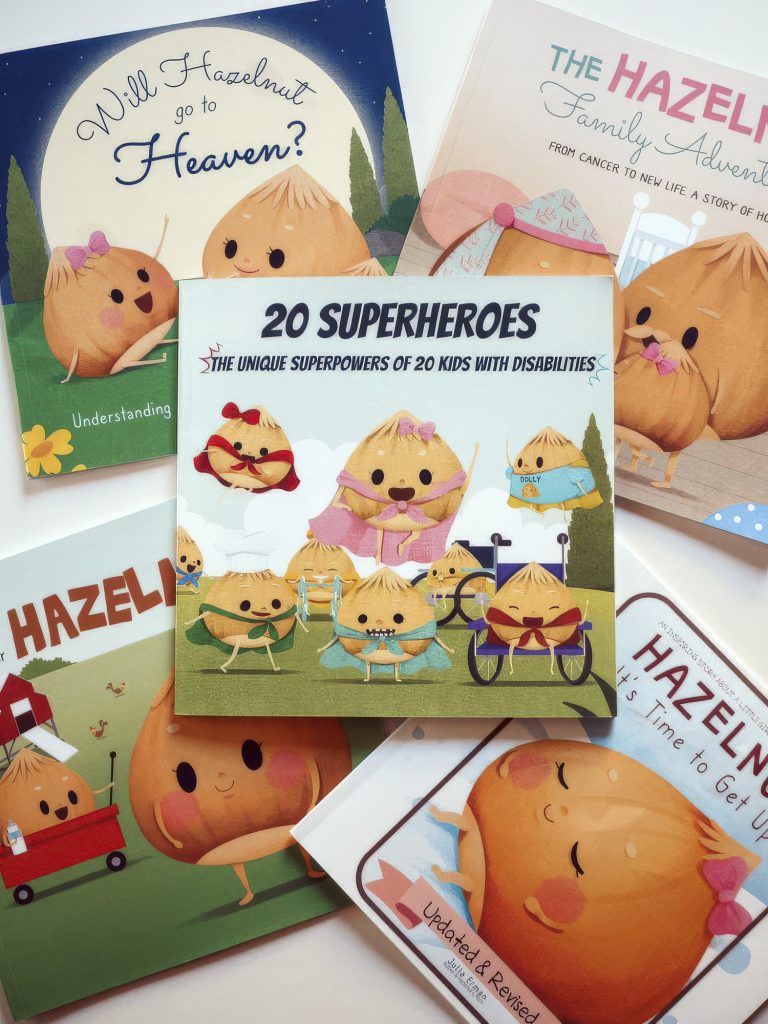How one family’s love and one doctor’s support are changing lives.
On a small farm about an hour from here, mom of two Julia Erman turns on a light at 4 a.m. She says her best writing happens in the quiet hours of the morning.
In another part of the region, a different mom of two Dr. Jessica Sheah gets up early and drives to work at East Tennessee Children’s Hospital.
And over the last three years, these two moms have been through an awful lot together.
Julia lives on five acres with her husband, Aaron, and their two kids, Hazel, 7-and-a-half, and Russell, almost 5. With chickens, 100 new chicks, bees, a farm cat, and as of last year, some pigs, the farm is busy. Life sounds idyllic, but it was a tough set of circumstances that brought Julia and Aaron to look for a home in Tennessee—they were also looking for a hospital.
“We knew that Knoxville had the best children’s hospital,” Julia says. “We were first connected with Dr. Jessica Sheah and I think we had an appointment with her even before we moved.”
Hazel and Russell have a rare genetic disorder called Nonketotic Hyperglycinemia or NKH. It affects the body’s ability to break down glycine, an amino acid, causing it to build up in the brain and ultimately causing severe neurological issues. After years without answers as to what was impacting their children, the Ermans finally had them. Since then, it’s been Julia and Aaron’s mission to give their children the best life possible.

“Hazel is nonverbal,” Julia says. “She walks like a drunk sailor. I don’t have any other words to explain it. Her intellectual ability is between 8 months and a year. She is the happiest kid you have ever met in your entire life. I do not know why, but ever since she was born, she just walks in a room and the room lights up. She attracts people like crazy. She brings smiles to people’s faces.
“[Russell] is in a wheelchair and he is also nonverbal. His development is probably 6 to 8 months and his disorder is a little more progressed. We haven’t had an MRI on our kids for a few years but his last MRI shows that he actually has holes in his brain. Russell is also very happy and he is obsessed with music. I don’t know how he got this obsession, but he likes music with a really good beat, and every time, he moves his hands and dances. He has rhythm. He’s a total joy.”
A Rare Disorder
There are not many scientific papers written about NKH. According to a more recent one from 2023, only one in 76,000 people worldwide are diagnosed with the disorder. And the life expectancy of a child with this disorder is low, many not making it out of their first month of life, others not living past their fifth birthday.
“I think that there are probably lots that go undiagnosed,” Julia says. “The only two kids ever documented with this disorder that have lived longer than Hazel and Russell lived till 9 and, I believe, 14.”
After learning of what was going on with their children and a long journey of medical interventions—as well as a move from home in Washington State in 2022—the Ermans found community and care in East Tennessee. And that started with Dr. Sheah.
“She was able to listen to where we were in our journey,” Julia explains. “We had done a ton of medical intervention. We had done a ton of therapy. We had done every MRI, every EEG. We were just kind of burnt out. We came in and told her our story, and she laid out options that she could connect us with. She was really open to creating a medical plan that fit our family’s goal, which was quality of life. And for us that is not in a hospital appointment every day or even every month.”

And that is why the two connected so deeply three years back. Dr. Sheah was supportive of how Julia and Aaron wanted to navigate medical care.
That quality of life the Ermans and Dr. Sheah have worked to make a reality has involved the kids being at home, living life on their small farm. They still do therapies, but Dr. Sheah walked them through what medical interventions were and were not necessary for the kids’ disorder. “She’s been the main person to manage any care as far as neurology goes for our kids for the last three years.”
Finding Care that Matches
Dr. Sheah’s way of working with the Ermans, the idea of meeting families where they are, exemplifies the sort of experience families receive when they connect with Children’s.
“Our mission at East Tennessee Children’s Hospital is to provide state-of-the-art care for every family that walks through our doors,” Dr. Sheah says, “which can mean anything from pursuing advanced emerging treatments to celebrating each child for their strengths and ensuring we do everything to help them meet their goals, being with them every step along the medical journey.”
That extends to her nursing team. While the kids come at this point every six months for appointments, Julia raves about the nurses too when talking about the support she receives: “If I ever need anything, I just call them and they just do whatever the kids need, whether it’s a doctor’s note or a change of medication,” Julia says. “They provide a ton of support over the phone, which actually has helped us limit appointments.”
Pediatric neurology is a fairly unique specialty; there’s a wide variety of conditions that physicians like Dr. Sheah handle. “There are some kids that I see once or twice and others that we’re gonna walk together for a long time, and I think that’s why I get along with Julia so well. Her goal for her kids is exactly the same as my goal for all of my patients, which is that I want these kids t be able to reach their full potential, whatever that is.”
Sharing Their Story
Julia’s mission is to share her story so others will not feel alone. She does so by sharing her journal on social networks, but also by going into schools and putting on programs and assemblies in the community. Over the last few years, the Hazelnut Movement, as it has come to be called, has gotten bigger.

When Hazel turned 1, Julia said she was desperate to have a resource to understand why Hazel didn’t seem “typical.” That spurred her to write.
“The first book was Hazelnut, Time To Get Up. I made a Shutterfly version and gave it to all my friends and family.”
Hazelnut t-shirts with the character from my book soon followed. So did other books. And last June they partnered with Luke 14 Ministries based out of Morristown to keep spreading the message.
Julia hopes to one day provide bags of books and materials to the 4,000 families that are getting a disability diagnosis this year in Tennessee, “giving them the tiniest piece, just a tiny gift, a piece of hope.”
For Dr. Sheah, seeing how a family has created a ripple effect of positivity in the community has been inspiring.
“This book just puts life back into perspective — let’s celebrate each individual for who they are and their unique superpowers, celebrating each and every success, big or small with love, kindness and acceptance,” she says.
“I think Julia’s superpower is sharing that with other parents facing difficult medical diagnoses through her books and the Hazelnut Movement.” It’s just one more reason
Dr. Sheah is grateful to be working in a pediatric field.
“Working with the Erman family is one of the many reasons I feel so fortunate to be a pediatric neurologist,” Dr. Sheah says. “They are a great reminder that this field can be challenging, but there is also so much joy and success that we can offer to enrich lives.”

Choosing Joy
While this life is not what she and Aaron imagined before they had children, it is theirs, and Julia has made a point of ensuring no aspect of it is taken for granted. They’ve found joy in what seems to be an impossible situation, knowing each day is gift. And with a strong support system around them, Julia says she and Aaron are blessed with an unwavering faith that “makes no sense.”
“We just know that our kids are a gift. They’re here for a reason or blessing. They are joyful. They are really hard, but one day they’re going to die and they’re going to go be with Jesus,” she says. “That doesn’t scare us, whereas for most people it’s a very fearful thing if you really kind of put your mind around it.
“In a sense, I feel like I’ve been chosen to show people this one thing: that you can hold suffering and at the same time, you can hold joy, too.”

Comments are closed.